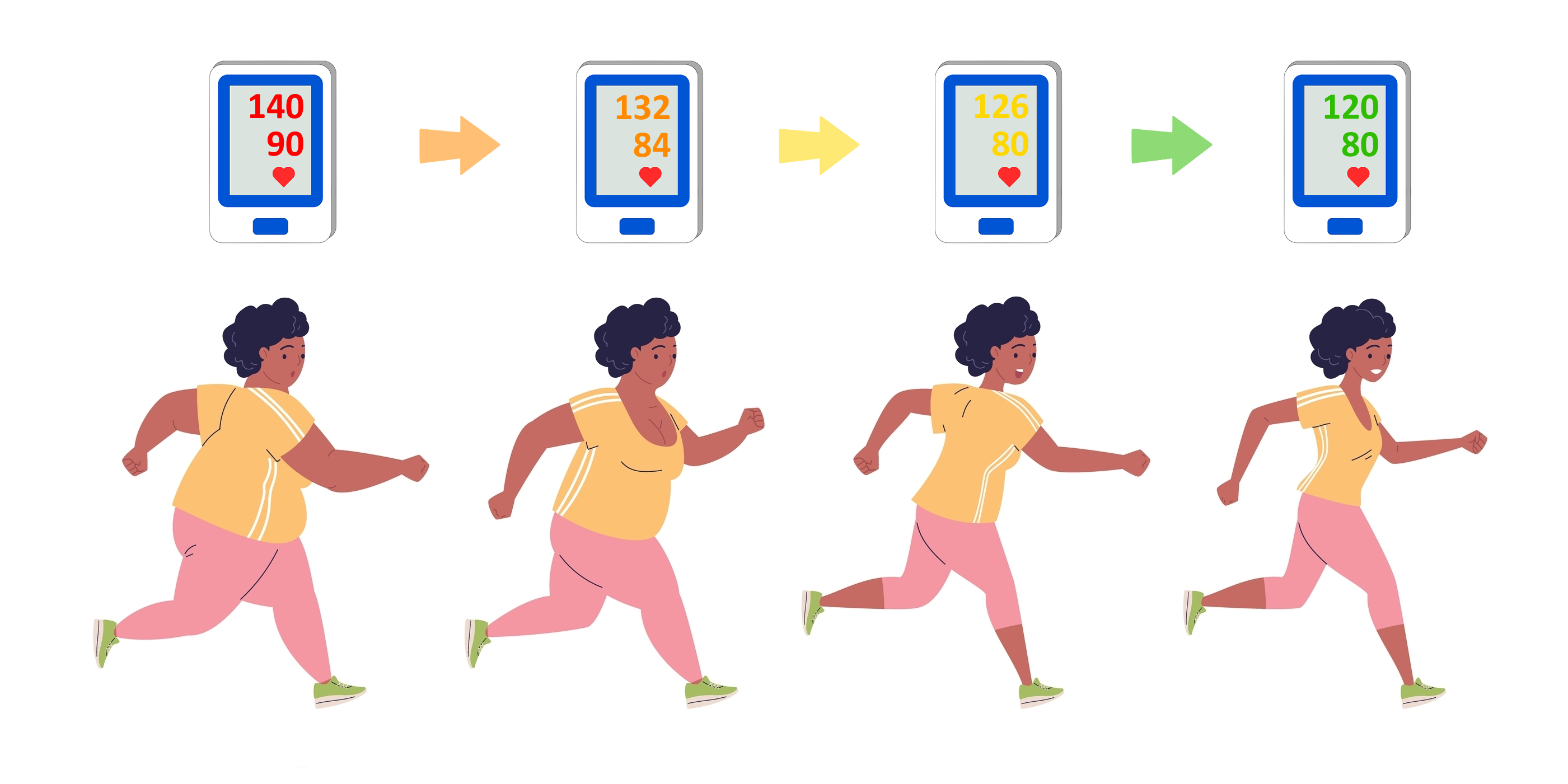Losing weight can lower blood pressure in people who are overweight or obese.1,2 Excess weight is one of the most preventable risk factors for high blood pressure and its related diseases.1,2
Weight Loss Recommendations
The 2017 ACC/AHA hypertension guidelines state that doctors should promote nonpharmacological therapy to everyone with elevated blood pressure or diagnosed hypertension.1 Weight loss is specifically recommended for adults with elevated or high blood pressure who are overweight or obese [Strong Recommendation (Level A)]. The best goal is an individual’s ideal body weight which is a body mass index (BMI) between 18.5 and 25. But recognizing this is unrealistic for many overweight and obese people, they recommend most overweight adults should aim to lower body weight by at least 1 kg (2.2 lbs). People can expect about 1 mm Hg reduction for every 1 kg (2.2 lbs) of weight loss.
The 2013 Obesity Society and ACC/AHA guidelines recommend that doctors counsel overweight and obese adults that they may be at increased risk for cardiovascular disease (such as elevated blood pressure, dyslipidemia, fatal and nonfatal heart attack, heart failure, and stroke), type 2 diabetes, and all-cause mortality [Strong Recommendation (Level B)].2 People should also be told that their risk of these serious conditions increases as their BMI increases [Strong Recommendation (Level B)].
Sustained weight loss of more than 5% of body weight can lower blood pressure, lower LDL cholesterol, raise HDL cholesterol levels, and reduce the need for antihypertensive medications [Strong Recommendation (Level A)]. This recommendation is based on the review of eight systematic reviews and meta-analyses which included randomized trials of both dietary interventions alone and dietary plus orlistat (weight-loss medication) interventions. The authors determined that the weighted mean reduction in blood pressure from a 5% weight loss was about 3 mm Hg systolic and 2 mm Hg diastolic. They concluded that even a modest sustained weight loss of 3% to 5% of body weight can have significant health benefits.
In the 2016 guidelines for medical care of patients with obesity, experts recommend that overweight or obese people with elevated blood pressure or hypertension should lower their weight by 5% to 15% or more of their body weight.3 They should use lifestyle modifications which include regular physical activity and a restricted-calorie diet to achieve their blood pressure goals [Recommendation Grade A; BEL 1]. Some of these people may need to add weight loss medication, such as orlistat or lorcaserin, to their lifestyle therapy to achieve their weight loss goals [Recommendation Grade B; BEL 1]. People with a BMI ≥35 and one or more severe complications related to obesity may need to consider bariatric surgery to lower weight and improve CVD risk [Recommendation Grade A; BEL 1].
Studies of Efficacy of Weight Loss for Blood Pressure Reduction
Studies show that weight loss can lower blood pressure in overweight and obese adults. A 2016 Cochrane Review meta-analysis found eight randomized controlled trials of 2,100 adults (mean age 45 to 66 years) which studied weight-reducing diets against no dietary intervention for at least 24 weeks.4 The review found that people on the dietary regimen lost more weight than the controls by a mean difference (MD) of -4.0 kg (-8.8 lbs) (95% CI [-4.8 – -3.2]). Only three of the studies measured blood pressure in relation to weight loss so although there is evidence to support the premise that lowering weight lowers blood pressure, the small sample size involved resulted in it being rated as low-quality evidence by the authors. The analysis of the three studies found that blood pressure was reduced in people on the weight loss diets compared to controls by MD -4.5 mm Hg (95% CI [-7.2 – -1.8 mm Hg]) for systolic blood pressure and MD -3.2 mm Hg (95% CI [-4.8 – -1.5 mm Hg]) for diastolic blood pressure.
A 2016 systematic review and meta-analysis of 24 randomized controlled trials of six month duration or longer (n=23,858 overweight or obese adults, age 34 – 67 years) evaluated the effect of a variety of dietary interventions and their estimated aggregate effects on blood pressure.5 An analysis of studies grouped by similar diets found that the DASH (Dietary Approaches to Stop Hypertension) diet (four trials, five comparison groups) resulted in the largest reduction in blood pressure with −7.62 mm Hg (95% CI [-9.95 – -5.29]) for systolic and −4.22 mm Hg (95% CI [-5.87 – -2.57]) for diastolic. The DASH diet focuses on heart-healthy foods like vegetables, fruits, whole grains, and protein from low-fat dairy, fish, nuts, and poultry. It also limits sugar-sweetened food and drink and saturated fats. Next most beneficial diets were a low-calorie diet with blood pressure reductions of -3.18 mm Hg (95% CI [-4.24 – -2.11]) systolic and -1.28 mm Hg (95% CI [-1.87 – -0.69]) diastolic and a low sodium, high potassium diet with a -3.14 mm Hg (95% CI [-6.27 – -0.02]) systolic and -2.01 mm Hg (95% CI [-3.40 – -0.62]) diastolic. A low sodium diet resulted in blood pressure reductions of −2.06 mm Hg (95% CI [-3.50 – -0.63]) for systolic and −1.30 mm Hg (95% CI [-2.37 – -0.23]) for diastolic. Ten of the trials included only hypertensive participants (≥140/80) and these participants had significantly greater net blood pressure reductions than the trials of normotensive people.
A 2003 meta-analysis of 25 randomized controlled trials of nonpharmacologic weight loss (n=4,874, mean initial BMI 30.7 kg/m2) found that when weight loss expressed per kilogram resulted in blood pressure reductions of -1.05 mm Hg (95% CI [-1.43 – -0.66) systolic and -0.92 mm Hg (95% CI [-1.28 – -0.55) diastolic.6 They also found that in populations with more than 5 kg (11 lbs) weight loss as compared to less than 5 kg weight loss, the blood pressure reduction was significantly more with -6.63 mm Hg (95% CI [-8.43 – -4.82]) vs -2.70 mm Hg (95% CI [-4.59 – -0.81]) systolic and -5.12 mm Hg (95% CI [-6.48 – -3.75]) vs -2.01 mm Hg (95% CI [-3.47 – -0.54]) diastolic.
Recommended Weight Loss Methods for Lowering Blood Pressure
The 2017 ACC/AHA guidelines recommend that doctors take an active role promoting a healthy lifestyle with behavioral and motivational strategies [Strong Recommendation (Level C-EO)].1 Nonpharmacological therapies include losing weight, a healthy diet, sodium reduction, exercise, higher intake of dietary potassium, smoking cessation, and moderating alcohol consumption. Doctors should reassess blood pressure in three to six months for people just adopting healthy habits. People adopting healthy habits and started on antihypertensive medication should be assessed in one month.
Doctors can have an impact on patients’ adoption and adherence to weight loss goals with discussion.7,8 A 2010 meta-analysis of 74 trials found that cognitive-behavioral strategies can significantly help adults be successful at weight loss and maintaining healthy eating and activity habits.8 Goal setting, regular follow-up contact, check-ins, and self-monitoring all have strong evidence from randomized controlled trials that they promote behavior change.
References
- Whelton PK, Carey RM, Aronow WS, et al. 2017 ACC/AHA/AAPA/ABC/ACPM/AGS/APhA/ASH/ASPC/NMA/PCNA guideline for the prevention, detection, evaluation, and management of high blood pressure in adults: executive summary: a report of the American College of Cardiology/American Heart Association Task Force on Clinical Practice Guidelines. Hypertension 2017.
- Expert panel report: guidelines (2013) for the management of overweight and obesity in adults. Obesity (Silver Spring) 2014; 22 Suppl 2: S41-410.
- Garvey WT, Mechanick JI, Brett EM, et al. American Association of Clinical Endocrinologists and American College of Endocrinology comprehensive clinical practice guidelines for medical care of patients with obesity. Endocr Pract 2016; 22 Suppl 3: 1-203.
- Semlitsch T, Jeitler K, Berghold A, et al. Long-term effects of weight-reducing diets in people with hypertension. Cochrane Database Syst Rev 2016; 3: Cd008274.
- Gay HC, Rao SG, Vaccarino V, Ali MK. Effects of different dietary interventions on blood pressure: systematic review and meta-analysis of randomized controlled trials. Hypertension 2016; 67 (4): 733-739.
- Neter JE, Stam BE, Kok FJ, Grobbee DE, Geleijnse JM. Influence of weight reduction on blood pressure: a meta-analysis of randomized controlled trials. Hypertension 2003; 42 (5): 878-884.
- Pool AC, Kraschnewski JL, Cover LA, et al. The impact of physician weight discussion on weight loss in US adults. Obes Res Clin Pract 2014; 8 (2): e131-139.
- Artinian NT, Fletcher GF, Mozaffarian D, et al. Interventions to promote physical activity and dietary lifestyle changes for cardiovascular risk factor reduction in adults: a scientific statement from the American Heart Association. Circulation 2010; 122 (4): 406-441.

.png)



